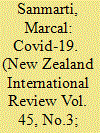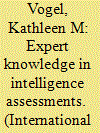| Srl | Item |
| 1 |
ID:
179151


|
|
|
|
|
| Summary/Abstract |
Marcal Sanmarti discusses the impact of the global pandemic on geopolitics and national strategies.
|
|
|
|
|
|
|
|
|
|
|
|
|
|
|
|
| 2 |
ID:
191877


|
|
|
|
|
| Summary/Abstract |
Scholarly debates on Chinese foreign policy in the Middle East and the international dimension of authoritarianism have gained momentum since Beijing’s Belt and Road Initiative (BRI) in 2013. At the same time, the global pandemic provided a window of opportunity to autocrats worldwide to fine-tune their modes of surveillance for the sake of regime survival. This article deconstructs Sino-Emirati relations in the field of digital surveillance. Inspired by Social Network Theory, we explore three transregional public-private elite networks as multipliers for the traveling of authoritarian practices. We show that authoritarian diffusion under the umbrella of fighting the pandemic is not spatially bound to geographical proximity or other structural similarities but rather a global phenomenon that state and non-state actors reproduce.
|
|
|
|
|
|
|
|
|
|
|
|
|
|
|
|
| 3 |
ID:
127889


|
|
|
|
|
| Publication |
2013.
|
| Summary/Abstract |
In 2011, scientists in the Netherlands and Japan announced that they had created a modified variant of the H5N1 avian influenza virus that was transmissible via aerosol, raising fears of a new, highly lethal H5N1 virus that could cause a deadly global pandemic. Soon, government officials and the media were raising alarms about the wisdom of publishing such experimental methods and results in the open scientific literature. Their concerns sparked a large public controversy about the H5N1 experiments and their potential publication. In the midst of this controversy, U.S. intelligence analysts began assessing the potential security implications of the H5N1 manuscripts, including whether a terrorist, criminal, or state could easily replicate these experiments and create mutated viruses for bioweapons use. An in-depth look at this controversy reveals that, first, U.S. intelligence analysts do not have adequate social and material resources to identify and evaluate the tacit knowledge, or know-how, that underpins dual-use experiments such as those in the H5N1 case. Second, they lack dedicated structures and methods to understand the politics that characterize the use of technical expertise in such controversial biosecurity issues. Third, they require new types, structures, and uses of expert knowledge to enable them to make more informed and balanced assessments of biosecurity threats.
|
|
|
|
|
|
|
|
|
|
|
|
|
|
|
|